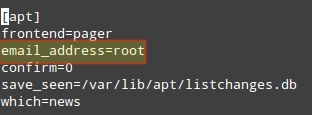It has been said before -and I couldn’t agree more- that some of the best system administrators are those who seem (note the use of the word seem here) to be lazy all the time.
While that may sound somewhat paradoxical, I bet it must be true in most cases – not because they are not doing the job they are supposed to be doing, but rather because they have automated most of it.
One of the critical needs of a Linux system is to be kept up to date with the latest security patches available for the corresponding distribution.
In this article we will explain how to set up yourDebianandUbuntusystem to auto install (or update) essential security packages or patches automatically when needed.
Other Linux distributions such as[CentOS/RHEL configured to install security updates automatically][1].
Needless to say, you will need superuser privileges in order to perform the tasks outlined in this article.
### Configure Automatic Security Updates On Debian/Ubuntu
whereapt-listchangeswill report what has been changed during an upgrade.
Next, open/etc/apt/apt.conf.d/50unattended-upgradeswith your preferred text editor and add this line inside theUnattended-Upgrade::Origins-Patternblock:
```
Unattended-Upgrade::Mail "root";
```
Finally, use the following command to create and populated the required configuration file (/etc/apt/apt.conf.d/20auto-upgrades) to activate the unattended updates:
```
# dpkg-reconfigure -plow unattended-upgrades
```
Choose`Yes`when prompted to install unattended upgrades:
[

][2]
Configure Unattended Security Updates on Debian
then check that the following two lines have been added to/etc/apt/apt.conf.d/20auto-upgrades:
```
APT::Periodic::Update-Package-Lists "1";
APT::Periodic::Unattended-Upgrade "1";
```
And add this line to make reports verbose:
```
APT::Periodic::Verbose "2";
```
Last, inspect/etc/apt/listchanges.confto make sure notifications will be sent toroot.
[

][3]
Notify Security Updates on Debian
In this post we have explained how to make sure your system is updated regularly with the latest security patches. Additionally, you learned how to set up notifications in order to keep yourself informed when patches are applied.
Do you have any questions about this article? Feel free to drop us a note using the comment form below. We look forward to hearing from you.